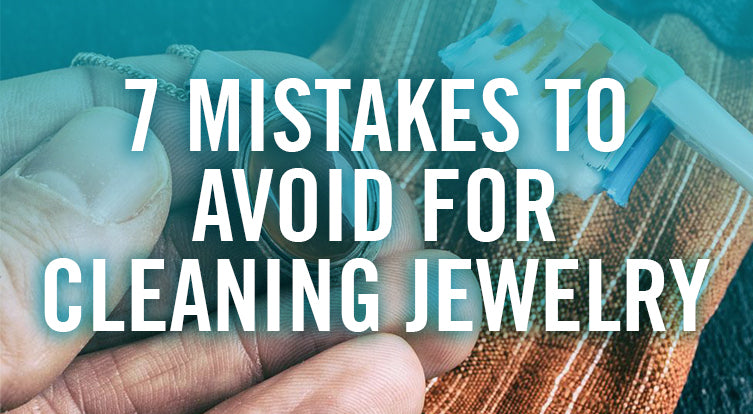7 Common Mistakes to Avoid for Cleaning Jewelry

You want to keep your favorite jewelry looking as good as possible for as long as possible, right? It's most likely going to have to involve some routine cleaning.
Even jewelry that isn't worn often can sometimes require some tarnishing care or a quick shine.
There are a lot of DIY tutorials for cleaning jewelry on the internet, but unfortunately, not all of them are created equal. If you're not careful, you can end up either doing nothing of use or completely ruining your jewelry.
We are obviously biased as we have a whole line of professional jewelry cleaning solutions to use at home. That aside, we would hate to see you ruin your jewelry with some inferior products or even at home remedies.
If you want to avoid any expensive jewelry mishaps, you're in the right place. Keep reading to learn about a few common jewelry cleaning mistakes and how to avoid them. We made mistakes so you don't have to!
1. Not Knowing What Your Jewelry is Made of
This might seem obvious, but this is the #1 mistake that you can make when it comes to cleaning your jewelry, and it doesn't even have anything to do with the cleaning process.
When you see a tutorial for jewelry cleaning online, it's probably going to specify what it is that's being cleaned. Not all materials are alike, and some of them can be damaged by plenty of DIY cleaning techniques. For example we don't recommend any soft stones in our Ultrasonic Jewelry Cleaner.
If you have expensive or delicate jewelry, make sure that you're following techniques that are for those jewelry types. Some metals scratch easily, and plated pieces can be easy to ruin.
2. Wearing It In the Shower
Some people choose to just wear their jewelry when they're in the bath or shower, allowing it to get clean this way.
For some jewelry, this isn't that big of a deal. 14k gold, titanium, and implant-grade steel hold up fairly well to water.
Many more kinds of jewelry, though, will not fare so well.
Hard water can damage fragile jewelry, and too much heat can pose a problem to some of the adhesives that are used to keep your jewelry together.
In short, you and your jewelry should bathe separately if at all possible.
3. Using A Toothbrush and Toothpaste
You've probably seen this one all over the internet. Clean your jewelry at home with products that you (hopefully) already have in your bathroom!
On the surface, it makes sense. A toothbrush has small bristles that should easily penetrate the small crevices of chain links and bezels. Toothpaste is safe enough for braces and it certainly makes your teeth shiny, so that should be okay too, right?
Well, not exactly.
Like we mentioned before, some types of jewelry are incredibly soft and prone to scratching. This goes for both metals and stones. If you're using toothpaste and a toothbrush, you're using something abrasive.
Leave those cleaning supplies where they belong and try something different.
4. Dunking It In Lemon Juice
Lemon juice is an ingredient in so many DIY activities that you're likely tired of hearing about it.
Lemon juice is known as a brightener. If this sour citrus can brighten and lighten your hair, why can't it do the same to your jewelry?
Well, it can, but at a cost.
Lemon juice is incredibly acidic. While this might be okay for sturdier jewelry, for anything soft or plated, you're asking for trouble. It's too abrasive for your delicate jewelry and you'll end up with chips, scratches, and discoloration.
Don't weaken your jewelry with lemon juice.
5. Trying Bleach
Bleach can clean anything, right? It's a great disinfectant and you likely already have it in the house.
There are a few problems here.
Especially when undiluted, bleach is incredibly powerful. Metal can begin to break down when overexposed to bleach, even your precious gold.
Even if it's diluted, bleach is far too alkaline to be used as a jewelry cleaner. Just as lemon juice is too acidic, things that are too alkaline will also pose a problem. Try to keep a good pH balance when you're looking for cleansers.
6. Boiling Your Jewelry
So you can't use any harsh acids or cleansers, but what about just dropping it in boiling water? That should sanitize the jewelry, right?
Well, kind of.
In theory, brief periods in hot water shouldn't bother your jewelry too much. It's not uncommon to use steam for some kinds of jewelry (so long as there aren't any glues involved).
What becomes problematic is the contact with the bottom of the pot. Hot glass or metal can damage the jewelry, causing it to warp and become misshapen.
A quick dip in a boiling pot likely won't cause too much damage, but if you're working with soft or thin metals, skip the boiling water.
7. Not Trying Professional Options for Delicate Jewelry
When you have expensive or fragile jewelry, it might be in your best interest to not go with the DIY method.
You might save a few dollars by not seeking professional help, or by not buying professional cleaning products made for jewelry, but those few dollars don't mean much when you've lost or damaged an expensive piece.
Before you go and try DIY cleaning methods, take a look at our solutions here or on Amazon. We have you completely covered and have a full range of solutions you will love.
Don't Make These Mistakes While Cleaning Jewelry!
When you're cleaning jewelry, make sure to keep it safe by not just using any DIY cleaning method that you find on the internet. You value your jewelry, so you don't want to mess it up by trying to save a few dollars.
If you have dirty or tarnished jewelry that you want to clean safely, and you'd like to try some professional products for a change, visit our site. We can make your jewelry shine. There is a reason we are the fastest growing jewelry cleaning solution online.
Sample Block Quote
Praesent vestibulum congue tellus at fringilla. Curabitur vitae semper sem, eu convallis est. Cras felis nunc commodo loremous convallis vitae interdum non nisl. Maecenas ac est sit amet augue pharetra convallis nec danos.
Sample Paragraph Text
Praesent vestibulum congue tellus at fringilla. Curabitur vitae semper sem, eu convallis est. Cras felis nunc commodo eu convallis vitae interdum non nisl. Maecenas ac est sit amet augue pharetra convallis nec danos dui.
Cras suscipit quam et turpis eleifend vitae malesuada magna congue. Damus id ullamcorper neque. Sed vitae mi a mi pretium aliquet ac sed elitos. Pellentesque nulla eros accumsan quis justo at tincidunt lobortis denimes loremous. Suspendisse vestibulum lectus in lectus volutpat, ut dapibus purus pulvinar. Vestibulum sit amet auctor ipsum.

